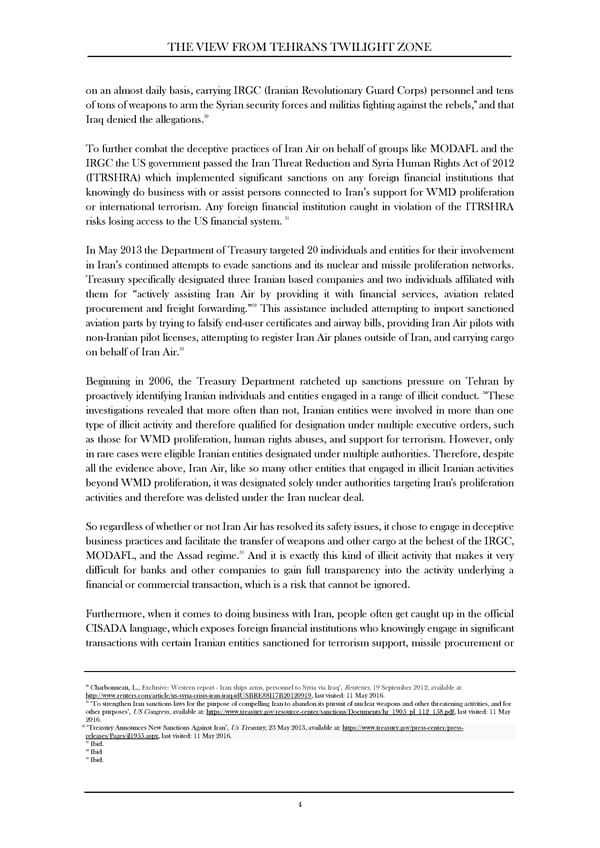THE VIEW FROM TEHRANS TWILIGHT ZONE on an almost daily basis, carrying IRGC (Iranian Revolutionary Guard Corps) personnel and tens of tons of weapons to arm the Syrian security forces and militias fighting against the rebels," and that 30 Iraq denied the allegations. To further combat the deceptive practices of Iran Air on behalf of groups like MODAFL and the IRGC the US government passed the Iran Threat Reduction and Syria Human Rights Act of 2012 (ITRSHRA) which implemented significant sanctions on any foreign financial institutions that knowingly do business with or assist persons connected to Iran’s support for WMD proliferation or international terrorism. Any foreign financial institution caught in violation of the ITRSHRA 31 risks losing access to the US financial system. In May 2013 the Department of Treasury targeted 20 individuals and entities for their involvement in Iran’s continued attempts to evade sanctions and its nuclear and missile proliferation networks. Treasury specifically designated three Iranian based companies and two individuals affiliated with them for “actively assisting Iran Air by providing it with financial services, aviation related 32 procurement and freight forwarding.” This assistance included attempting to import sanctioned aviation parts by trying to falsify end-user certificates and airway bills, providing Iran Air pilots with non-Iranian pilot licenses, attempting to register Iran Air planes outside of Iran, and carrying cargo 33 on behalf of Iran Air. Beginning in 2006, the Treasury Department ratcheted up sanctions pressure on Tehran by 34 proactively identifying Iranian individuals and entities engaged in a range of illicit conduct. These investigations revealed that more often than not, Iranian entities were involved in more than one type of illicit activity and therefore qualified for designation under multiple executive orders, such as those for WMD proliferation, human rights abuses, and support for terrorism. However, only in rare cases were eligible Iranian entities designated under multiple authorities. Therefore, despite all the evidence above, Iran Air, like so many other entities that engaged in illicit Iranian activities beyond WMD proliferation, it was designated solely under authorities targeting Iran's proliferation activities and therefore was delisted under the Iran nuclear deal. So regardless of whether or not Iran Air has resolved its safety issues, it chose to engage in deceptive business practices and facilitate the transfer of weapons and other cargo at the behest of the IRGC, 35 MODAFL, and the Assad regime. And it is exactly this kind of illicit activity that makes it very difficult for banks and other companies to gain full transparency into the activity underlying a financial or commercial transaction, which is a risk that cannot be ignored. Furthermore, when it comes to doing business with Iran, people often get caught up in the official CISADA language, which exposes foreign financial institutions who knowingly engage in significant transactions with certain Iranian entities sanctioned for terrorism support, missile procurement or 30 Charbonneau, L., Exclusive: Western report - Iran ships arms, personnel to Syria via Iraq’, Reuteurs, 19 September 2012, available at: http://www.reuters.com/article/us-syria-crisis-iran-iraq-idUSBRE88I17B20120919, last visited: 11 May 2016. 31 ‘To strengthen Iran sanctions laws for the purpose of compelling Iran to abandon its pursuit of nuclear weapons and other threatening activities, and for other purposes’, US Congress, available at: https://www.treasury.gov/resource-center/sanctions/Documents/hr_1905_pl_112_158.pdf, last visited: 11 May 2016. 32 ‘Treasury Announces New Sanctions Against Iran’, Us Treasury, 23 May 2013, available at: https://www.treasury.gov/press-center/press- releases/Pages/jl1955.aspx, last visited: 11 May 2016. 33 Ibid. 34 Ibid 35 Ibid. 4
 The View from Tehran's Twilight Zone Page 6 Page 8
The View from Tehran's Twilight Zone Page 6 Page 8